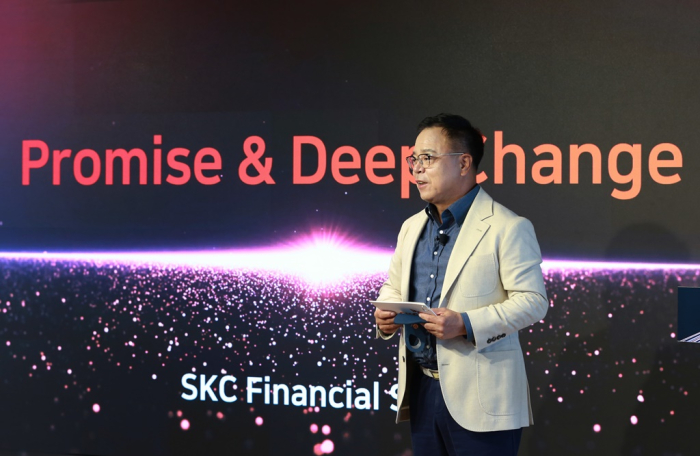-
KOSPI 2577.27 -2.21 -0.09%
-
KOSDAQ 722.52 -7.07 -0.97%
-
KOSPI200 341.49 +0.02 +0.01%
-
USD/KRW 1396 -2.00 0.14%
SKC to raise corporate value to $25 bn with battery materials
Battery materials
SKC to raise corporate value to $25 bn with battery materials
To sevenfold global copper foil capacity to 250,000 tons with investment in Europe, US, Southeast Asia
By
Sep 24, 2021 (Gmt+09:00)
2
Min read
News+

South Korea’s SKC Co. plans to expand its electric vehicle battery materials business in a move to fivefold its corporate value to 30 trillion won ($25.4 billion) by 2025.
The chemical materials maker of SK Group on Sept. 24 unveiled five-year plans to generate 80% of profits from mobility materials, including a capacity expansion for copper foil, a core material for EV batteries.
“We will change the business structure to focus on the next generation anode materials, cathode materials and copper foil for the secondary battery, as well as semiconductor substrate sectors,” said SKC CEO Lee Wan-jae.
SKC plans to more than sevenfold its capacity of copper foil to 250,000 tons, including 100,000 tons in Europe, 50,000 tons in the US and 50,000 tons in Southeast Asia, by 2025 from 34,000 tons in 2020. In January, the company announced it will build its first overseas plant of copper foils in Malaysia with a capacity of 44,000 tons for 650 billion won. Copper foil collects electrons generated by electrochemical reactions.

GLOBAL NO. 1 COPPER FOIL MAKER
With the expansion, SKC aims to increase its global market shares to 35%, becoming the world’s No. 1 maker, by 2025 from 16% last year.
SKC decided to start business for new materials that can significantly improve performance of the secondary battery.
“We will secure anode materials technology by cooperation with global top silicon companies and develop it as a core business,” Lee said.
Those plans are expected to raise a revenue from business related to the secondary battery such as copper foil to more than 4 trillion won, about a tenfold of 2020, according to SKC.
SEMICONDUCTOR MATERIALS
The company plans to expand the semiconductor materials business to high-tech products. It will nurture its glass substrate for high-performance computing, which was developed for the first time in the world, along with existing CMP pads and blank masks as a new growth engine. The substrate helps users halve power consumption and process more data, according to the company.
“Semiconductor materials are currently in a state where technology development has been completed right before mass production,” Lee said. “We also got prototype certification from global semiconductor manufacturers.”
SKC aims to enhance eco-friendly material business, while improving existing film and chemicals units to focus on environmental, social and governance (ESG).
The company is slated to raise funds for the management goals through business joint ventures and policy financing.
Write to Jeong Min Nam at peux@hankyung.com
Jongwoo Cheon edited this article.
More To Read
-
 EV battery materialsSKC to spend $600 mn to build copper foil plant in Malaysia
EV battery materialsSKC to spend $600 mn to build copper foil plant in MalaysiaJan 26, 2021 (Gmt+09:00)
-
 EV battery materialsSKC to build first overseas copper foil plant in Malaysia
EV battery materialsSKC to build first overseas copper foil plant in MalaysiaDec 15, 2020 (Gmt+09:00)


